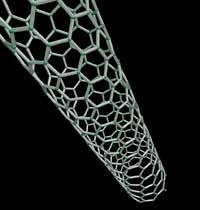Each nanotube aside!

It is not difficult to synthesize nanoscopic tubes made exclusively of carbon. However, physicists have not achieved absolute control in this synthesis, allowing them to obtain two types of nanotubes in the process. Now, physicists at Calsruhe University in Germany have developed a way to physically distribute both types.
Although both have been obtained in synthesis, semiconductor nanotubes with metallic properties do not serve the same applications, but both must be separated in order to be used.
The Karlsruhe University team has tested a method based on electrophoresis to distribute nanotubes. Normally, this technique is used in biochemistry for the distribution of proteins of different sizes by electric charge, but physicists tested it for the distribution of nanotubes, since one of the differences between both types of nanotubes is the dielectric constant. According to physicists, metal nanotubes have been distributed with a purity of 80%.





